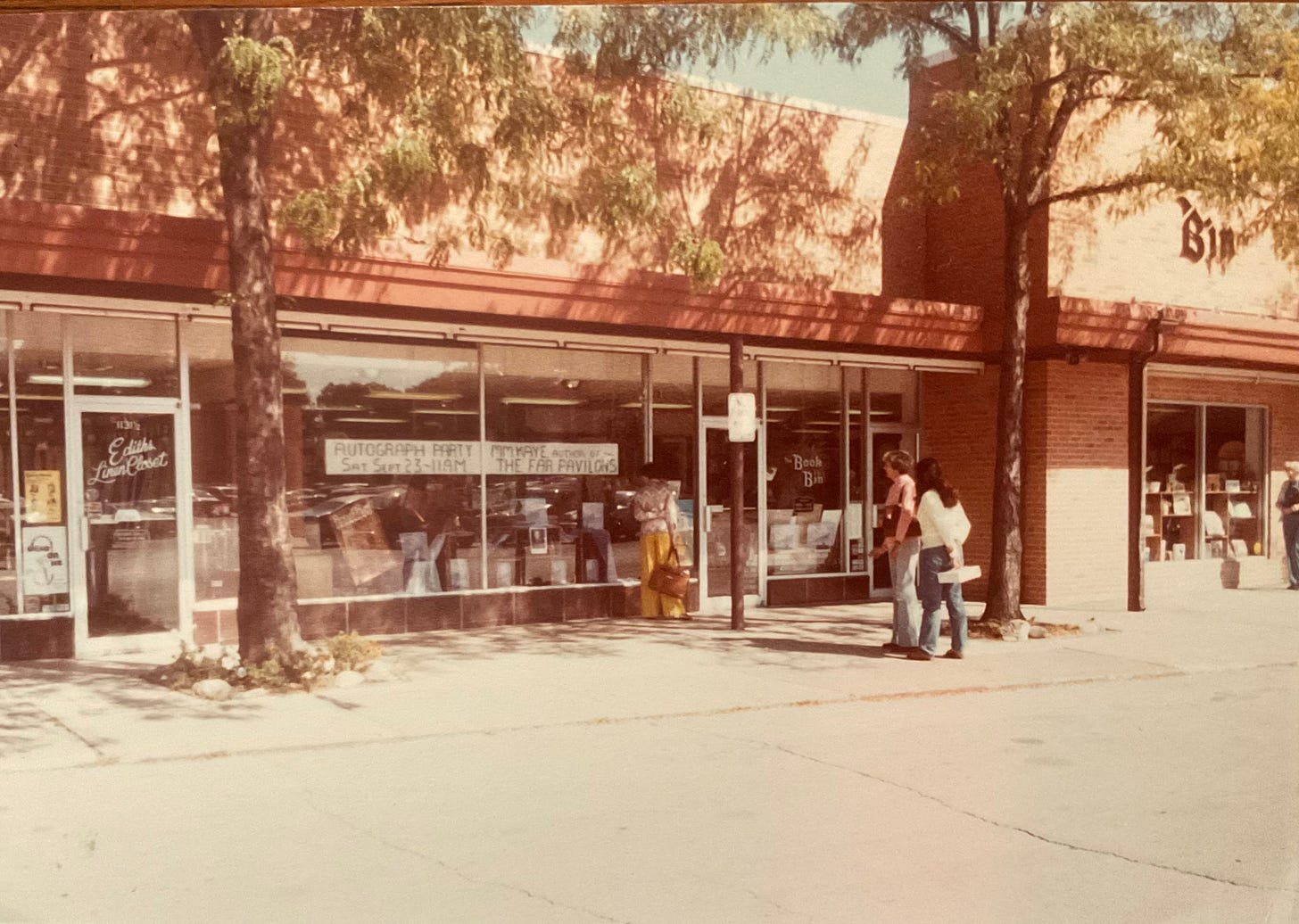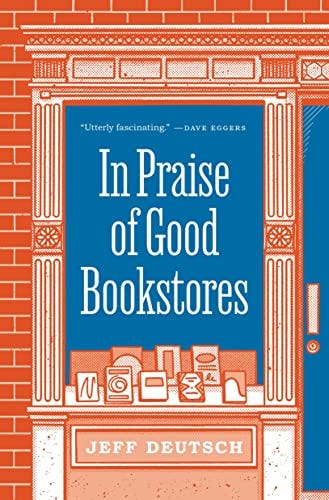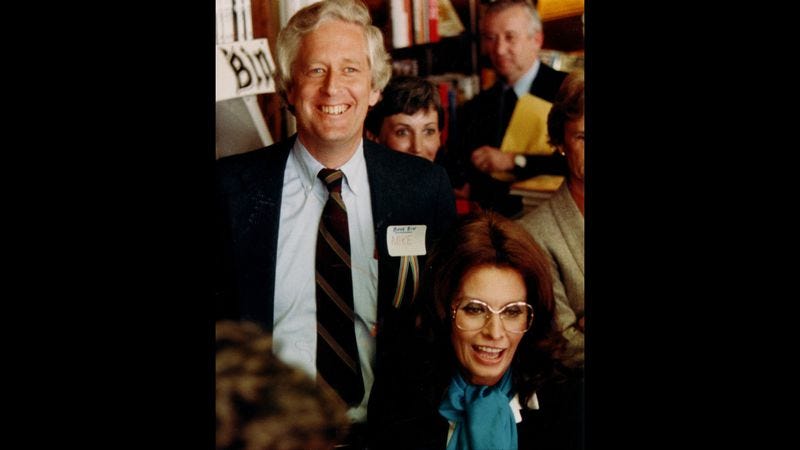This week’s Chicago Tribune column is about Jeff Deutsch’s wonderful new book, In Praise of Good Bookstores, a kind of personal and philosophical meditation on the nature of bookstores as both physical spaces and ideas in and of themselves. Deutsch is the longtime director of the Seminary Co-Op bookstores, located in Hyde Park on the University of Chicago campus, and the breadth and depth of thought on display in the book is stunning.
Longtime readers know that I literally grew up in a bookstore, the Book Bin in Northbrook, Illinois, which was started by my mom and three partners when I was a year old in 1971. Because I grew up in a bookstore I always assumed there was a direct association with bookstores and reading, that is without bookstores, there was no way you could acquire books.

At the store I was allowed to pick a book off the shelf and read it. If I wanted a book, Mom brought it home. Even more often books simply arrived unbidden, like if a new Encyclopedia Brown or Matt Christopher sports book had been released.
Sure, schools had books but they’d obviously gotten them from bookstores. I had no need for a library, even though Northbrook had quite a good one.
Deutsch believes, and I agree with him, that bookstores are not mere retail outlets, but are also aesthetic experiences not unlike an art gallery or museum. The curation and arrangement of books carries meaning beyond the contents on the inside of the books, or the fact that you can exchange money for an object. Anyone who went into the old Seminary Co-Op bookstore knows what it was like to descend into the warren-like space, the sense that you were entering a kind of sacred space, and not just because of its origins as a seminary.
The current version of the Seminary Co-Op store has two huge tables of face up books not long after you enter that pretty much demand you look at each one individually. This arrangement and the choice of books is obviously deliberate. Those tables by themselves give the shopper a clear sense of the kind of store you’ve entered.
I’ll put it this way, there isn’t a ziggurat of James Patterson’s latest dominating the view.
The original space for the Book Bin is now something like the personal hygiene aisle at Sunset Foods. The store moved over a few addresses, where I think there used to be a drug store, or maybe it was Country Cobbler shoes. The original store was so tiny it had a 1/2 in its address, 1133 1/2 Church Street. After a few years it expanded, but never got much over 1000 square feet.1 The checkout counter was in the center of the store, a big roll of wrapping paper always at the ready. My memory is that the original cash register was mechanical, later replaced by electric, but I could be romanticizing. Behind the counter was the entry to the small back office where the bookkeeping - as in business ledger type stuff - was done. To the right as you walked in was the new release hardcover display, and then deeper in was the children’s section with a built-in reading nook where I hung out as a kind of living display.
To the left and in the back were racks of mass market paperbacks, which I was tasked with helping inventory once I was a little older. The entire store used to have to shut down for a day or two so professionals armed with ten-key calculators at their sides like gunslingers poured through the store tallying how much it all added up to.
Because a bookstore once was essentially my home, just about every bookstore I enter can feel a little like that home, and I can’t help but compare it to my memories of the Book Bin. When I go to my local indie - The Village Bookseller in Mount Pleasant, SC - it can feel like stepping into a time machine. In that store I’ve had a powerful sense memory of the smell of the shelves that would be part of the Book Bin’s expansion being stained in the garage below my bedroom. The fumes wafting up through the floorboards didn’t kill the brain cells attached to that memory at least.
Just like the house I grew up in, the store was a place it’s own indelible memories. Perhaps the most indelible was a signing by Sophia Loren when I was a freshman in high school, which was such a big deal that my dad skipped work for perhaps the only time in his life. In the photo below, the man with the cheshire cat grin is him. My mom is partially obscured in the background over his shoulder.
Sophia Loren is the woman who looks like Sophia Loren.
Because I’ve always looked at bookstores as a kind of home place, Deutsch’s book has caused me to start re-seeing the bookstore space through a different eye. Over the years I’ve tried to express my gratitude for being lucky enough to grow-up with a bookstore in the family, but even that gratitude feels a little abstract. The Book Bin was just always there.
One of the main points of In Praise of Good Bookstores is the necessity of seeing bookstores as more than mere retail spaces.2 They are repositories of culture, expressions of the attitudes and values of communities in which they exist. There’s a reason why the Book Bin had a stack of best sellers in the front and the Seminary Co-Op does not.
It is important to recognize that his does not make one store superior to the other. They are reflections of the stakeholders who intersect with the places.
The business of books is rather terrible for bookstores and often requires sacrifices to keep them going. There were years that my mom barely paid herself despite working incredible hours, something only possible because that grinning guy up the page supported the family financially.
The Seminary Co-Op runs an annual deficit of $300,000 because it tries to pay its staff something close to what they’re worth, rather than squeezing out a marginal profit.
The store has been converted from its co-op structure where shareholders could in theory share in any surpluses to a non-profit in order to try to secure a sustainable future.
While both the Book Bin and the Seminary Co-Op have slightly different addresses than their original incarnation, it’s a great thing that they’re both going strong.
But Jeff Deutsch reminds us that even though these places feel like permanent institutions they cannot be taken for granted. The ecosystem they’re operating in his hostile, and the threats are only increasing.
In Praise of Good Bookstores is a reminder of what we’d be losing should they disappear.
Links
There are probably even more than 17 “amazing” fantasy and science fiction novels coming out this spring, but according to Buzzfeed, there at at least 17. Tor has young adult science fiction and fantasy that they want to recommend.
If you want to see the best-reviewed books last week, you have to click here and go to LitHub.
This article from the New York Times on how Barnes & Noble has gone from threat to savior of indie bookstores because it is large enough to check Amazon will possible be fodder for a future column from me, except I feel like I’ve been writing about the importance of finding balance in the book ecosystem for years and years. My feelings on the threat Amazon poses are pretty clear as well.
Esquire has 20 “incredible” books for spring.
Richard Russo’s wonderful novel, Straight Man, will be Bob Odenkirk’s next project at AMC, following the conclusion of Better Call Saul.
Recommendations
All books linked here are part of The Biblioracle Recommends bookshop at Bookshop.org. Affiliate income for purchases through the bookshop goes to Open Books in Chicago.
Affiliate income stands at $77.30 for the year.3
1. Exciting Times by Naoise Dolan
2. On Time and Water by Andri Snær Magnason
3. A Ghost in the Throat by Doireann Ní Ghríofa
3. Obit by Victoria Chang
5. The Left Hand of Darkness by Ursula K Le Guin
Ludovica C. - New York, NY (by way of Rome)
As Ludovica is someone from abroad living in New York, I’m going to recommend a classic novel about a New Yorker living abroad (in Paris), The Dud Avocado by Elaine Dundy.
Happy Easter to all those who observe.
Bonus content launching a new project I’m very excited about will be coming to your inbox sometime in the middle of next week.
JW
The Biblioracle
Mother Biblioracle will be reading this newsletter as she does every week and will for sure correct me on any of my misremembering. If there’s anything egregious, I’ll update in a future post.
This is why the brick and mortar Amazon stores failed so spectacularly. They were literally soulless.
I’ll match affiliate income up to 5% of annualized revenue for the newsletter, or $500, whichever is larger.






I have fond memories of Kroch's and Brentano's, which you mention in your print column. It was a marvel! And the only store the credit card for which my parents were reluctant to let my sibs and I use. Field's, Carson's - we could be trusted with those. But heaven only knows how much we would have spent at K&B!
The Seminary Co-op is my favorite bookstore. I've been a member for quite a while (though not as long as some others), and browsing there is one of the most enjoyable pastimes I have. It's rare that I don't buy something, often several "somethings". When they moved several years ago, I wrote this: https://joansbooks.blogspot.com/2013/01/a-new-seminary-co-op-bookstore.html Jack Cella was in charge then. Jeff is doing a splendid job now, under difficult circumstances, and his book is must reading for any bibliophile.
John, this article really touched me. I am about 20 years older than you, so I had the junior-high-through-college-aged experience of local bookstores like the Book Bin. I spent all my Saturday time divided between my local store The Book Stall, where I could only afford the mass market paperpacks, and the public library, which resembled a state capital building, where I borrowed and read nearly every fiction and drama book in the stacks. Between the two, i devoured equally willingly Leon Uris and Jacquelyn Suzanne, and Salinger, Steinbeck, Goldman, Eugene O’Neill, Tennessee Williams, James Baldwin, Ferlinghetti, Dostoyevski, Hardy, a wonderful series of Armenian family stories… I was a somewhat undiscerning reader, but I was totally moved and my current personality shaped by all these books. The bookstore itself was a godsend, because, unlike the previous bookstore with only hardcovers and no browsing, the new owner let young people linger for hours and even talked to them about their reading. Thank you for lighting up some joyous book memory neurons — with associated smells and emotions — in my brain today. You are a gifted writer! And much appreciation to your mother and other small bookstore owners for providing what amounted to the true eclectic education of many future adults.